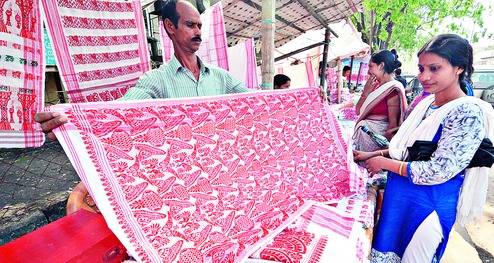
Guwahati, April 11: Weavers from rural Assam are doing brisk business in gamosas in the run-up to the Bihu festivities, following the official ban on the sale of the machine-made varieties purchased from outside the state.
Weavers from different parts of the state and under different self-help groups are participating in several pre-Bohag Bihu melas.
Gamosa, a traditional cotton towel presented to someone as a mark of respect, is one of the main products for sale in such fairs.
The Assam government has banned the sale of machine-made traditional clothes like gamosa, mekhela sador and dokhona in the state, under The Handloom (Reservation of Articles for Production) Act, 1985. The government today published advertisements in local newspapers, requesting people to inform the district offices of the state handloom department if someone is found selling machine-made products.
Nijara Kalita of Borka Boa Kota Mahila Xomobai Xamiti, a women's co-operative group, has set up a stall at a fair at Ambari here. She said they had done business of nearly Rs 50,000 in the past three days. "There are 150 weavers in our co-operative. Every weaver gets Rs 20 to Rs 50 for each gamosa depending on its size. Our annual turnover is about Rs 10 lakh," said Kalita.
Jiyaur Rahman of Navadeep self-help group from Hajo, said in the past three days they had sold gamosas worth nearly Rs 12,000. The price of a gamosa ranges from Rs 60 to Rs 1,000.
"We have over 100 weavers who get 25 per cent from every gamosa as bonus. Our annual turnover is about Rs 3.8 lakh, including other garments," said Rahman.
Another city-based self-help group, Unnyanmukhi, has sold gamosas worth around Rs 30,000.
The state handloom and textiles directorate has taken steps to make enough handloom gamosas available in the markets. Last year, officials from the handloom department conducted raids at the shops of several cloth dealers in the city with the help of the district administration to stop the sale of machine-made imported gamosas.
Cloth merchants import these machine-made gamosas from textile units in Bengal, Rajasthan and Gujarat.
Talking to The Telegraph, the deputy handloom officer of the state handloom and textiles directorate, Bipul Das, said, "After coming to power, the new government had ordered us to produce one lakh gamosas within three months. We met the target. Besides, in the past six months our units have produced 25,000 more gamosas. Machine-made gamosas are depriving the handloom weavers of their earnings."
Das said in their search for cheaper gamosas, people end up buying the mill-made ones.
"The people face a hard time in distinguishing between handloom and machine-made gamosas. But a closer examination will reveal the difference. The machine-made ones have a smoother finish because of the synthetic yarn used in their manufacture while the hand-made ones are a bit rough, being woven from twisted mercerised cotton yarn. The machine-made gamosas are of a uniform size, while the original items differ in size from weaver to weaver," Das said.
A gamosa mela was been held this year on the office premises of the director of handloom and textiles at Ambari here with the slogan Buy Indigenous Handloom Products and Support the Weavers.










